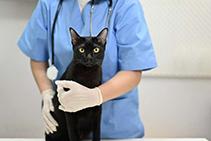
As cat owners in The Woodlands, TX, it's essential to understand that cats are experts at hiding signs of pain or illness. In the wild, showing weakness can make them vulnerable to predators, so they instinctively conceal their ailments. However, as responsible pet owners, it's crucial to recognize the signs of illness in cats to ensure their health and well-being. In this blog post, brought to you by True Animal Vet located at 4524 Research Forest Drive, we will guide you on identifying these signs and seeking timely veterinary care.
Change in Appearance
One of the indicators of a cat's illness is a change in their physical appearance. If you notice that your cat's coat is greasy, unkempt, or less shiny than usual, it could be a sign of illness. Look for clumps of loose fur or increased dandruff production. Additionally, observe if your cat appears more hunched, moves less gracefully, carries their tail differently, or tilts their head, as these changes can indicate an underlying problem.
Reduced Socialization
While cats are naturally less social than dogs, a sudden change in their social behavior can indicate illness. If your typically friendly cat starts avoiding social interaction and isolating themselves, it could be a sign of an underlying health issue. Pay attention to any unwillingness to come near you, as it may be a signal that something is wrong.
Increased Vocalization
Unusual or increased vocalization in your cat could be a sign of pain or a neurological condition. If your cat becomes more vocal than usual and the behavior persists for more than 24 to 36 hours, it's important to address the issue promptly.
Ignoring Food or Snacks
A cat's refusal to eat, especially when presented with their favorite food, should raise concern. While occasional upset stomachs are normal, persistent refusal to eat for more than 24 hours could indicate an oral infection, damaged tooth, foreign body ingestion, respiratory disease, or even a severe condition like cancer. Contact True Animal Vet as soon as possible for a thorough checkup and diagnosis.
Excessive Thirst
If you notice your cat drinking more water than usual, such as their water bowl emptying faster or attempting to drink from other sources like faucets or toilets, it could indicate an underlying health problem. Conditions like hyperthyroid disease and diabetes can cause increased thirst, and early detection allows for effective treatment.
Inability to Urinate
Inability to urinate, also known as a blocked cat, is a severe and potentially life-threatening condition in felines. When a cat is unable to urinate, it can lead to a dangerous buildup of toxins in their body. If you notice your cat straining to urinate, vocalizing during attempts, or showing signs of distress, it's crucial to seek immediate veterinary care at True Animal Vet. Our experienced team can diagnose and treat this urgent condition, ensuring the well-being and health of your beloved cat.
Additional Signs of Illness
Be vigilant for other signs of illness in your cat, including frequent vomiting (especially if it continues for more than two days), bad breath, unexplained weight loss, sudden mood changes, increased lethargy, dilated or constricted pupils, shortness of breath, rapid breathing, and limping or visible injuries.
Contact True Animal Vet in The Woodlands, Texas
For more information on recognizing signs of illness in cats or to seek professional veterinary care, contact True Animal Vet. Our dedicated team is located at 4524 Research Forest Drive, The Woodlands, TX 77381. To book an appointment today, call (281) 867-5968 or text (281) 916-3282.
By being attentive to your cat's well-being and recognizing signs of illness, you can ensure timely veterinary care and provide the best possible support for your feline companion's health. Trust True Animal Vet for expert care and guidance.










